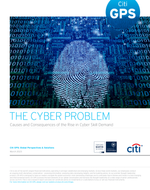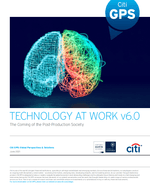Citi
Helen H Krause, Brian Yeung, Cecily Josten, Grace Lordan & Pantelis Koutroumpis
View CITI GPS ReportWhat did you want to be when you grew up? As a kid, you probably chose occupations you saw in the local community or one that followed in your parents’ footsteps. Maybe a teacher, doctor, nurse, or fireman. Television opened a whole new list of possibilities leading to visions of being an astronaut or a movie star. But in the 1970s, very few kids would have said they wanted to be a data scientist.
The Citi GPS “Technology at Work” report series launched with the statistic that 47% of jobs in the United States were at risk of automation over the forthcoming decades and similar shares were estimated for other countries. In subsequent reports, we looked at how the rise of e-commerce was affecting employment; the trends in the workforce from the COVID-19 pandemic; and the potential for outsourcing not only manufacturing jobs, but service jobs as well.
While we focused on how technology and automation could negatively affect jobs, we struggled to predict jobs yet to be invented. In the 2019 Citi GPS report Technology at Work v4.0: Navigating the Future of Work, we noted we were on the brink of a technological revolution with the advent of artificial intelligence. Although AI-enabled automation could affect low-income jobs typically performed by workers with no more than a high school degree, jobs less likely to be replaced would require at least a college degree and consist of tasks centered on complex social interactions and creative skills.
With AI now upon us and leading us into the “Fourth Industrial Revolution,” hiring has evolved from requiring specific education and experience criteria to looking more at detailed skills requirements. In today's rapidly changing job market, demand for specific skills is also changing rapidly. It is important to understand the the skills that are rising and falling in demand and how the wages for these skills are changing.
Looking at professional occupations, we identified two “soft” skills groups and seven “cognitive” skills groups that are increasingly relevant for the future of work and deemed important based on the frequency in which they appear in job advertisements. Overall, the soft skill collaborative leadership increased in importance over time in terms of demand and hourly wages. We also found that cognitive skills in data science are constantly evolving, causing certain data science skills to attract a wage premium in one period, then lose it in the next. Looking specifically at AI, demand for AI skills has increased globally by 9 times for “Tech-AI” jobs and 11.3 times for “Broad-AI” ones since 2015.
Constantly evolving technology leads to shifting changes in skill set demand. Because of this, continuous learning will be critical in the future, particularly in data science, for employees to stay relevant. For corporates, this means workforce upskilling will be increasingly important. For investors, analyzing the skills being demanded by a company can determine if that company is seeking the skills most relevant in today’s economy.
Dreaming about being a data scientist as a kid would have been a great choice; collecting the skills to meet the role’s changing requirements as an adult is an even better one.





